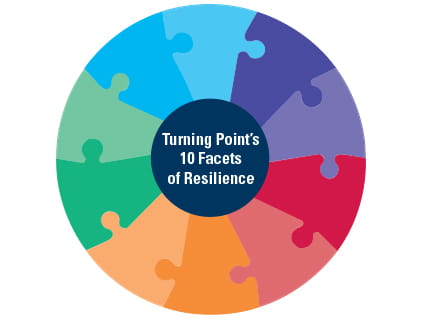December 30, 2020
As part of The University of Kansas Health System, Turning Point offers resources and tools for staying resilient during difficult times, such as the COVID-19 pandemic. These videos provide self-calming techniques and tips on self-care, emotional expression and more.

Turning Point’s 10 Facets of Resilience
The 10 Facets of Resilience© will help you stay resilient during difficult times, including the COVID-19 pandemic.
Steps for self-compassion
It’s important to give yourself the same support and compassion you give others, especially during the COVID-19 pandemic. Use these tips from Dr. Kristen Neff.
Acknowledge your emotions, pain or stress.
Tell yourself:
- This is really hard.
- I’m struggling with this.
- I feel _____.
Remind yourself you are not alone.
Tell yourself:
- It is normal to have strong feelings.
- Everyone is having a hard time adapting and coping.
- We all have limitations, even when we try our best.
Give yourself some compassion.
Tell yourself:
- I can stay patient and kind with myself and others.
- My feelings are valid but do not have to define me or overwhelm me.
- I am doing the best I can in this moment and that is enough.
For more tips, visit self-compassion.org.
How to practice loving kindness
Several studies from the Max Planck Institute in Germany found a loving kindness practice reduces healthcare workers' feelings of distress and burnout. A loving kindness practice activates completely different brain circuits for these workers, allowing them to compassionately interact with patients without taking on their sorrow and worry.
When you have done what is within your control for others, it might still feel like you should do more to help. It is important to realize where your helping role and area of control end and wish the best for yourself and others, despite unknowns or unresolved issues.
A loving kindness practice helps reduce feelings of distress and burnout when caring for others. Follow the phrases and instructions below to create your own loving kindness practice.
- Take some deep breaths and tell yourself the following phrases using "I" statements.
- Repeat the phrases for people you love, work with or care for using "you" statements.
- Extend loving kindness to all people, including yourself, using "we" statements.
Loving kindness phrases:
- May I/you/we be free from fear.
- May I/you/we be happy.
- May I/you/we be well.
- May I/you/we live life in peace (or with ease).
Try to focus on the feelings of love and happiness as you repeat these phrases to yourself. You may choose to say the phrases for your family and friends, people you are caring for, your broader community or the world at large.
You can simplify the practice by repeating only one of the phrases that has a special meaning to you.
Dr. Moira Mulhern: When you've done what's within your control, it might still feel like you should do more. It's important to realize where your helping role and areas of control end even though there are still unknowns or unresolved issues. So, how do you deal with that helpless feeling after you've done all that you can? One practice that can help reduce feelings of distress and burnout when caring for others is called the loving kindness practice. Follow these phrases and instructions to create your own practice. And here's what it looks like.
Start by making sure that you're in a comfortable position. You can close your eyes or keep them open. Take a few deep breaths and just settle in and then repeat these phrases to yourself. May I be free from fear. May I be happy. May I be well. May I live life in peace. So you repeat these phrases for yourself first and then you start repeating them for people that you care for. So, you might choose to say the phrases for your family, friends, people you're caring for, even people you're in conflict with, to your community and even the world. It's very important that you focus on the feeling of happiness and peace as you are repeating these phrases. You can simplify this exercise by repeating only one of the phrases that has meaning to you. So for instance, if you're focusing specifically on happiness, you would pick the phrase, may I be happy. Thanks for tuning in. This is Dr. Moira Mulhern from Turning Point. For more tips or resources, check out the tips for staying resilient page on the hospital website.
Reference: Goleman, D. & Davidson, R. (2017). Altered traits: Science reveals how meditation changes your mind, body, and brain. Penguin Books USA.
Paced breathing
We can't prevent stressful things from happening in our lives, but we can bring ourselves back from reactions to stress and do our best to recover in the moment.
Model the calm you hope to see in others. Anxiety passes easily from person to person, but so does calmness. We must be able to regulate our own nervous system, and by doing that, we are the calm in the storm.
Research from HeartMath shows paced breathing helps our nervous system remain calm, while still allowing us to remain alert. Use the following steps to remain calm.
- First, notice when you start to feel tense or when you're holding your breath. Make sure you take some slower, deeper breaths. Extend the exhale like a long, heavy sigh. You can also breathe in for 5 counts and out for 5 counts or whatever rhythm feels natural to you.
- Next, daydream or call to mind a person, place, pet or activity that you love and appreciate. Continue breathing in a relaxed way as you call them to mind.
Dr. Moira Mulhern: We can't prevent stressful things from happening in our life, but we can bring ourselves back from stress reactions and recover quickly in the moment. Remember, anxiety runs through the herd and so does calmness. We must be able to regulate our own nervous system and by doing that we will be the calm in the storm. Model the calm you hope to see in others. If you have time right now, try this exercise. This will only take a few minutes.
Make sure you're in a comfortable position. Close your eyes if you wish and begin by paying attention to your breathing. Is it deep and slow or shallow and fast? And now begin by slowing your breathing down by breathing in for five counts and out for five counts. And if that doesn't feel comfortable, you can breathe in for four and out for six. And if your mind wanders, that's okay. It's part of the exercise. Just acknowledge where it goes and then let it go.
Relaxation is not about clearing your mind. It's about noting and acknowledging your distractions, not trying to push them out or hang on to them. It's about treating your wondering mind the way a very loving parent treats a lively child, enjoying their expressions of life, gently protecting them and bringing them back when they start to wander away. So breathe in for five counts and breathe out for five counts.
And now begin to daydream about people, places or activities that you love and appreciate. And as you do this, focus on the feelings of happiness, love, appreciation. You could think about a place you've been before, a place you've always wanted to go, a particular activity that you love doing, or people that you love to be with.
And then whenever you're ready, count upwards from one to three, feeling more awake and more alert with each breath, until you open your eyes and stretch. Thanks for tuning in. This is Dr. Moira Mulhern from Turning Point. For more tips or resources, check out the tips for staying resilient on the hospital website.
Reference: HeartMath. (2020, April 9). The science of HeartMath.
Overcoming stress
When we're experiencing stress, we suffer mentally, physically and emotionally. The antidote is resilience, which comes naturally to some and is learned for others. During times of increased stress, self-calming techniques like those below have been shown to be highly effective in reducing the negative side effects.
Free relaxation resources
Learn more about our programs for people with chronic illness and caregivers.





